Peter Hazlehurst, CEO and co-founder of Synctera, is a global FinTech entrepreneur and philanthropist with nearly 30 years of experience creating financial products for banks, FinTechs, and large tech companies. Launched in 2020, Synctera is an end-to-end platform with guided, personalized experiences that help FinTech builders create world-class products with embedded banking and card issuance. Peter moved from Australia to the US for his first startup in 1993, building a core banking system called Phoenix, that still powers many community banks today. Since then, Peter has served as Head of Uber Money, Chief Operating Officer at Postmates, Senior Director of Product Management at Google, CEO and Board Member of Google Payments Corporation, and Chief Product Officer at Yodlee. Peter also led Product at Nokia for Enterprise Mobility and Mobile email and has served as a CTO and consultant at several startups.
What does “entrepreneurship” mean to you?
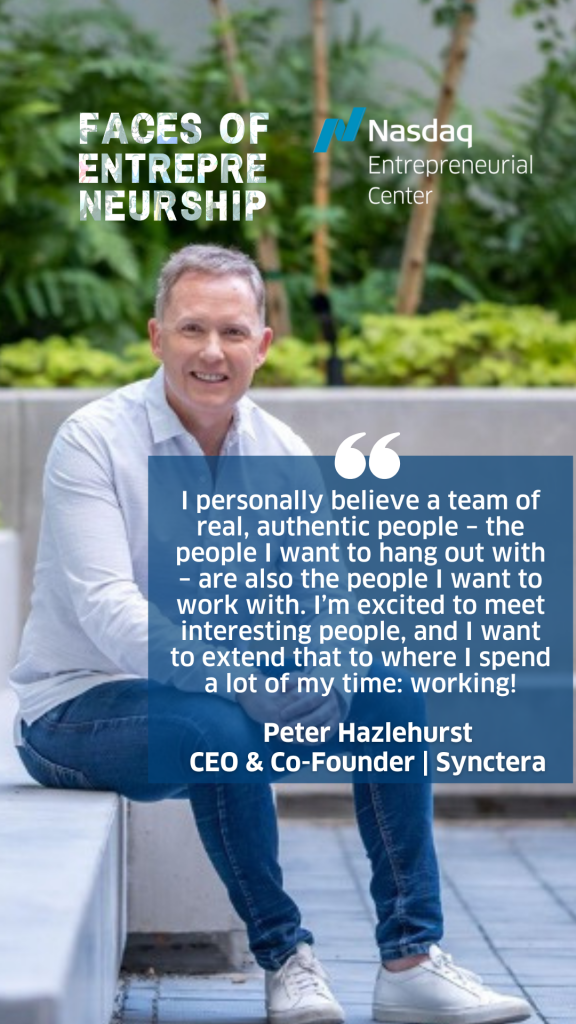 Peter Hazlehurst: To me, entrepreneurship means a combination of tenacity, creativity and consistency. Whether that’s learning about a new industry, building a new product, or creating a new company, entrepreneurship is showing up day after day and taking one step forward. Knowing where you are going, generally, and encouraging people to join in your vision and yet having the ability to pivot and adjust as you get more input. Rome wasn’t built in a day, nor were any of the biggest companies or leaders that run them. You don’t even have to make massive, giant, universe changes either – consistently putting in work will add up and compound over time to create something incredible, whatever you believe that is. You’re going to have setbacks and obstacles. Don’t let that break your soul. You have to have the tenacity to continue with your vision and put in the work.
Peter Hazlehurst: To me, entrepreneurship means a combination of tenacity, creativity and consistency. Whether that’s learning about a new industry, building a new product, or creating a new company, entrepreneurship is showing up day after day and taking one step forward. Knowing where you are going, generally, and encouraging people to join in your vision and yet having the ability to pivot and adjust as you get more input. Rome wasn’t built in a day, nor were any of the biggest companies or leaders that run them. You don’t even have to make massive, giant, universe changes either – consistently putting in work will add up and compound over time to create something incredible, whatever you believe that is. You’re going to have setbacks and obstacles. Don’t let that break your soul. You have to have the tenacity to continue with your vision and put in the work.
Tell us about your first experience with entrepreneurship.
PH: In 1993, I left my home in Australia and moved to North Carolina to build banking software. I was super young, out of my element, and from a completely different culture. Here I was, an Aussie talking with somewhat old-fashioned, successful banking leaders who were skeptical of the digital revolution. This was the dawn of Windows and PCs were still super new. We had to tell them the world was changing, their methods were outdated, and pitch them new technology that would change their businesses. I had to consistently build my brand, learn how to win people over, and get better at convincing folks I wasn’t just a hacker, and that I could provide some value with a unique product I had helped build. There were a lot of different obstacles I had to overcome, and a lot of learning I had to do. But I was consistent, I punched in daily, I made calls to bankers daily to sell them and pitch them on some of the first financial technology before FinTech. I’ve been following that model ever since. (It was exciting to sell “servers” with 1GB hard drives!)
What is your company’s origin story? What is the biggest reason you started your business?
PH: I led a big team at Uber focused on Payments – some incredibly hard-working, talented, and driven people. We had an idea to make a neobank for our drivers that helped them get real-time payments and access to great banking products. But despite the talent and resources, it took tremendous work: months and years to launch it, countless teams in Product, Legal, Compliance, Engineers, Marketing. A bunch of stuff, it took a village.
We learned that the cost of creating and launching a FinTech was really expensive and really hard to build. And that led us to our problem: most FinTechs and Founders don’t have the funds or resources to make their innovative and helpful financial products real.
With Synctera, that’s the question we have set out to answer: what’s the fastest and easiest way to build a FinTech? And we’re really excited with our early results and the traction we’ve got with the market.
What did those early days look like and teach you? What do you wish you knew when you started? Is there anything you would do differently?
PH: With Synctera, we were born in the summer of 2020 – right at the height of the pandemic. We had to set up our organization to be a remote-first company and operate asynchronously, giving people the choice to work wherever they want depending on how they were feeling about seeing people in-person. At first it felt odd, but now it’s clearly an advantage. So, if anything, the early days were learning how to better operate and run a remote-first company. We did a good job learning our way into it, but it wasn’t a first company skillset for me considering I had mostly worked in-person for most of my career; I had to adapt my working and management style to the company and remote access – it was a really interesting growth period for me.
Outside of the remote dynamics, I also found how interesting it is that partners will be on your sidelines waiting for your success – fortunately, that collaboration is inherent in banking and payments, and it takes a lot of different moving parts to make a financial product. There’s always a worry that bigger incumbents will edge you out and you’ll need to fight for everything in order to make advances. But the reality is it’s not a zero-sum game. I don’t win if you lose – we can both win.
What does “success” look like for you? We’d love to hear your biggest, boldest dream? What do you think will help you achieve it?
PH: Success to me looks like building a long-term, self-sustaining company that’s profitable and valuable for stakeholders. We have a lot of stakeholders: our employees, our investors, and importantly, our FinTech customers building the future of finance. To be valuable, we need to deliver great programs for consumers via our customers, and make it really easy to build, test, and launch a FinTech that can empower people and give them better access. The vision we have is this: if we can make banking and finance an enjoyable experience that can help people, we’ll be able to unlock time people would have spent worrying about their financial lives or having access restricted to banking and payment rails. We’re early in the game, but we’re really excited about what we’re building and helping build for under-resourced communities.
What is your superpower as an entrepreneur? What is your proudest and darkest moment so far? Share a key high and a key low from your journey if you can.
PH: I think my superpower is my resilience and tenacity: things are going to break, deals are going to fail at the last minute, it’s not going to all go according to your plan. The key is “don’t get broken.” That ethos has allowed me to be calm-ish during some big storms I’ve experienced.
Key high: raising the seed round for Synctera in a short period of time and that people wanted to bet on us really quickly was awesome – we got people to believe in us and invest.
Big low: having to wind down Perfect Sip, a wine startup I was working on in 2017-2018 was really sad. We were doing something super fun and it was working really well, but unfortunately, one of our key partners stepped back from the wine space and that affected our plans to scale.
What are your personal driving principles, your top values?
PH: I have two main ones:
- Great teams coupled with great strategies build great companies
- If you find something that’s not working, deal with it quickly and don’t let it fester
How have your personal principles and values shaped your company’s values and principles? Give us some examples.
PH: I personally believe a team of real, authentic people –the people I want to hang out with– are also the people I want to work with. I’m excited to meet interesting people, and I want to extend that to where I spend a lot of my time: working!
I also believe diversity of thoughts and ideas makes us win. I’ve been really impressed with the work our company has done to champion Diversity, Equity, and Inclusion initiatives to ensure we get a range of ideas and experiences from a group of new people that can challenge both how we operate and our preconceptions of the world.
Do you have a mentor? Tell us about what makes them valuable to you and your business? What role does mentorship play in your world (as a mentor or mentee)?
PH: I have two mentors:
Earl Stahl, who helped me during my youngest days as an engineer back in the early 90s. He was instrumental in helping me gain a lot of humility about determining whether I was a “hacker” or a “builder.” And I’ve realized that “building” translates to more than just businesses and products: people, your family, your health. Everything.
My godfather Alan Bateman – a producer and TV executive in Australia. He instilled in me trusting in the team, taking a risk on people, and appreciating diversity of thought, things that are important to the companies I help found.
Many entrepreneurs continue to perfect their daily routines to support their work and greater vision; would you mind sharing your morning routine or a regular ritual that grounds your work each day?
PH: In my personal time, I try to live the same principles: health > family > work. My reasoning is trying to stay healthy with exercise unlocks the ability to hang with the kids, and that all comes before work. If you’re not healthy, you can’t be present for your family or your team – both of which are depending on you.
Here’s my morning routine:
Every morning, I roust my kids out of bed, make them breakfast, and take them to school. I love cooking for friends and family, and food is a great part of my day I look forward to. I’ll then get a Peloton ride, sometimes simultaneously juggling work calls and emails, before launching into a full-day of work.
What are you reading?
PH: Sorry to say it’s not any business or self-help books, but instead, I’m a huge fan of spy thrillers and geopolitical-intrigue types of books. Right now I’m reading the Mark Greeney series of books “The Gray Man,” and I really enjoyed the Netflix adaptation. Some other books in this similar genre I’ve recently read have been from Brad Thor, Brad Taylor, Lee Child, and Vince Flynn. Can’t get enough of it.
Where do you go for inspiration?
PH: I go to Prison. Specifically, Pelican Bay: a supermax, Level 5 prison famously known for being one of the toughest places in the Californian prison system.
Me and a group of friends have been going to Pelican Bay on behalf of a prisoner advocacy group for a few years now to help the people there prepare for life on the outside with working skills, rehabilitation, occupational training, and more with the goal to limit recidivism and find a new purpose. It’s incredibly satisfying seeing the friends I’ve made succeed, and I’ve formed a lot of long relationships with people who have been incarcerated there, being really really lucky and humbled to see them come out, transition to life-outside, and complete parole. Learning and hearing about their experiences inspire me to think that all of the things that I believe are hard in my life are pretty minuscule compared to what some of my friends’ experience both before, during, and after prison. In my mind, to endure what these people will endure getting out of prison -the hardships, the stigma, everything- is what a true entrepreneur is: pushing forward in spite of overwhelming odds against you.
Do you have a favorite quote, mantra, or words of wisdom to get through the tough days?
PH: It changes weekly. I’m really into F1 lately, so I’ll go with Michael Schumacher: one of the most famous racers to get behind the wheel:
“I’ve always believed that you should never, ever give up and you should always keep fighting even when there’s only a slightest chance.”
What is a problem that keeps you up at night?
PH: This could be tied to my love of spy-fiction and geopolitical novels, but I worry about global uncertainty. We’re all interconnected, so when a war breaks out abroad, even though we may not experience the brutality and fighting, we will still experience the effects.
Changes in the environment are also top-of-mind: What’s gonna happen when we run out of water? What can we do differently? How to be more respectful of the environment?
There are things we all need to do to live harmoniously – we’re all connected at the end of the day.
What advice do you have for fellow (and aspiring) entrepreneurs building and leading teams?
PH: Here’s my key advice:
- Take your time hiring
- Find the best people that you can at any point of time
- Don’t be afraid to reassess every 6-12 months
- Building great teams requires constant adjustment to company’s growth to the new challenges ahead
- Great people adapt and are resilient
Do you have someone you’d like to nominate to be profiled in our Faces of Entrepreneurship series? Please let us know by emailing media@thecenter.nasdaq.org or submit your nomination using this form.
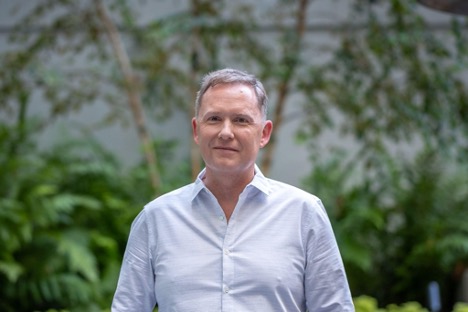
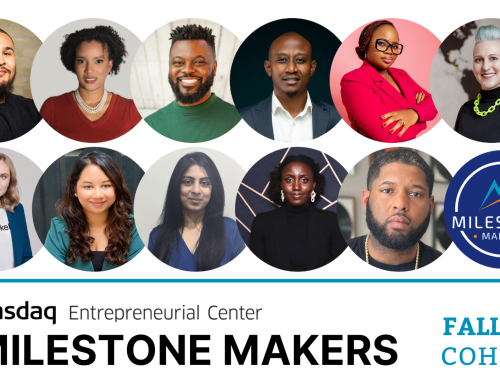
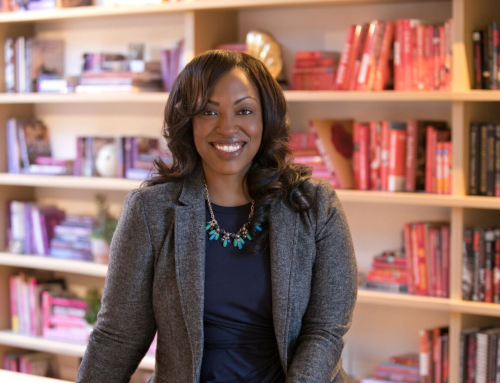
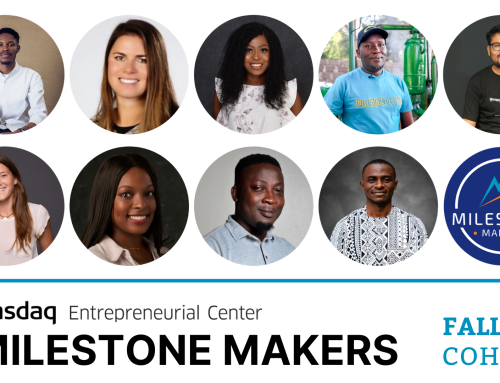
Invite a Friend
Close